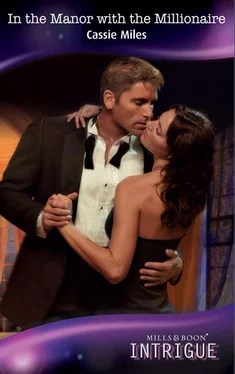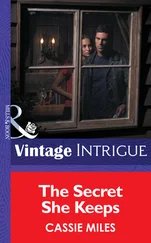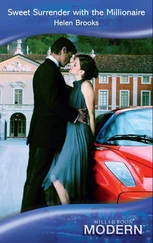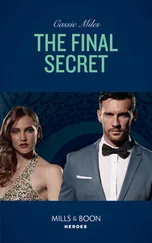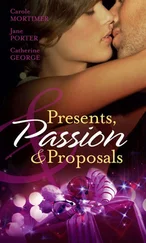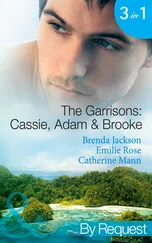His son wasn’t like everybody else. Far from it. But he appreciated the way she phrased her comments, and Duncan seemed to like her. Maybe Madeline Douglas would be a suitable tutor, after all.
He crossed the room and took a seat in a carved wooden rocking chair, one of several handmade pieces in the manor. “Show me your résumé and recommendations.”
When she gestured toward the window, the graceful motion of her wrist contrasted the baggy black T-shirt. “All my papers are in my car, which is still down the road.”
“Where you ran into Teddy Fisher.”
“I didn’t want to mention this in front of Duncan,” she said, “but Dr. Fisher had a handgun.”
Not good news . He hated to hear that the local loons were armed. Fisher had tons of money and a decent reputation as a scientist with his own laboratories in Raven’s Cliff. He came from a good family; his father had been a Nobel Prize winner. But Teddy’s behavior went beyond eccentric into borderline insanity.
The main reason Blake had taken this job—a step down from his typically high-profile architectural assignments— was because he wanted to get Duncan out of the city into a small-town environment where the pace was slow and distractions were minimal.
“Teddy Fisher owns the Manor,” he said. “But he’s not supposed to visit without notifying me. I’ll remind him.”
She gave a brisk nod. “If you like, I can tell you about my qualifications.”
“Do it.”
She started by rattling off her educational achievements, special recognitions and a bachelor’s degree from an undistinguished college which had taken six years because she’d been holding down a job while going to school. For two years, she’d taught second grade at a parochial school. “Then I started substitute teaching in some of Boston’s inner-city schools.”
He held up his hand, signaling a stop. “Why did you leave a full-time position to be a sub?”
“Alma might have mentioned that I grew up in the foster-care system.”
Vaguely, he recalled some comment. “She might have.”
“I was a throwaway kid. No one expected me to amount to much. But I had a teacher in third grade…a wonderful teacher. She wouldn’t let me shirk on my assignments, made me work hard and kept after me to do better. She noticed me.”
Behind her glasses, her eyes teared up. “She changed my life. By working in inner-city schools, I felt like I might make that kind of difference.”
He liked her earnest compassion. She sure as hell had the empathy needed to work with his son. But did she have the training? Blake wasn’t accustomed to settling for second best. “How much do you know about autism?”
She picked up a straight-back wooden chair and moved it close to his rocker. When she sat, she leaned forward. “What can you tell me about Duncan’s behavior?”
“On the behavioral range of autism, he’s considered to be high-functioning.” Blake had taken his son to a cadre of doctors and therapists. “Initially, we tried drug therapy, but Duncan didn’t respond well. The specialists call his condition a form of hypersensitivity.”
“Which is why he doesn’t like to be touched.”
“When he touches someone, he says that he knows what they’re thinking.”
“Like a psychic.”
“Don’t go there,” he warned. It was difficult enough to manage Duncan’s illness without the extra burden of some harebrained, paranormal philosophy.
“I’m trying to understand,” she said. “When I found Duncan in the woods, we had a coherent communication. More important, he reacted to me. He looked me in the eye, and he smiled. That behavior isn’t consistent with what I know about autism.”
Her presumption ticked him off. For the past three years, since his wife had died, he’d struggled with his son’s condition. They’d gone through brain scans, blood tests, physical and psychological diagnostics…. He rose from the rocking chair. “Are you an expert?”
“No, but I can see the obvious.” Instead of cowering, she stood to confront him. “Duncan is smart. And he cares about what you think. He wants you to love him.”
Her words were a slap in the face. Tight-lipped, he said, “This interview is over.”
WITH THE ECHO of the door slamming behind Blake still ringing in her ears, Madeline collapsed onto the bed. Disaster! She’d infuriated Blake and blown her chance at this job. Truly a shame because she thought she might work well with Duncan, and she found herself drawn to his father. What red-blooded woman wouldn’t be? Blake was gorgeous and intense. Unfortunately, he despised her.
She shifted around on the bed. Before she went to sleep, she needed to use the facilities.
Since there was no adjoining bathroom with this bedroom, she had to go into the hallway. Poking her head out the door, she checked to make sure Blake was nowhere in sight. One doorway stood ajar and light spilled into the corridor. Duncan’s room. She tiptoed past.
“Madeline?”
Peeking into his room, she said, “You remembered my name. Hi, Duncan.”
“Will I see my friend again?”
She had no right to be here, no justifiable reason to talk with Blake’s son. But she couldn’t turn away from this troubled child. Slipping into his room, she pulled a rocking chair near his bed. “Is her name Temperance?”
“Temperance Raven.”
“Like the town,” Madeline said. “Raven’s Cliff.”
“Temperance lied to me about the town being named after her daddy in 1794. But I don’t care. Lots of people lie. Liar, liar, pants on fire.”
“Hang them up on a telephone wire,” she responded. “You like rhymes.”
“Temperance gave me a present.” He rolled over on his bed and picked up a smooth, white shell.
Madeline grinned. “She sells seashells.”
“By the seashore,” Duncan concluded.
Though their conversation scattered in several directions, they were communicating. Instead of telling him that she liked his room, she pointed up at the ceiling and recited, “Starlight, star bright. First star I see tonight.”
He watched her with an intensity that reminded her of his father. “Finish the rhyme.”
“Wish I may, wish I might, have the wish I wish tonight.”
He parroted the rhyme back to her perfectly. Not once, but three times. Then he laughed.
Hearing a sound near the door, she glanced over her shoulder and saw Blake standing in the hallway. He stepped away too quickly for her to decide if he was angry about her talking to Duncan. And, frankly, she didn’t care. This wasn’t about him.
“Duncan,” she said, “I know a very long rhyme. A poem about baseball.”
He nodded for her to continue.
“You’d like baseball. It’s all about numbers.” She drew a diamond in the air as she talked about the bases and the pitcher and the batter. “Four balls and three strikes.”
“Three strikes and you’re out,” he said.
“You’re right,” she said. “This poem is called ‘Casey at the Bat.’”
He lay back on his pillow to listen while she recited the poem she’d memorized in fifth grade. The rhyming cadence lulled him, and Duncan’s eyelids began to droop.
When she had finished, he roused himself. “Again.”
She started over. By the time she finished, he was sound asleep.
Leaving his door ajar, exactly the way she’d found it, she went down the hallway to the bathroom. Like every other part of the house she’d seen, the room was sorely in need of fresh paint. But it seemed clean and had an old- fashioned claw-footed tub. Fantastic! One of her favorite pastimes was a long, hot soak. And why not? It wasn’t as if she could make Blake Monroe dislike her even more. Besides, she didn’t know when or if she’d ever have the chance to luxuriate in a tub again.
Читать дальше
